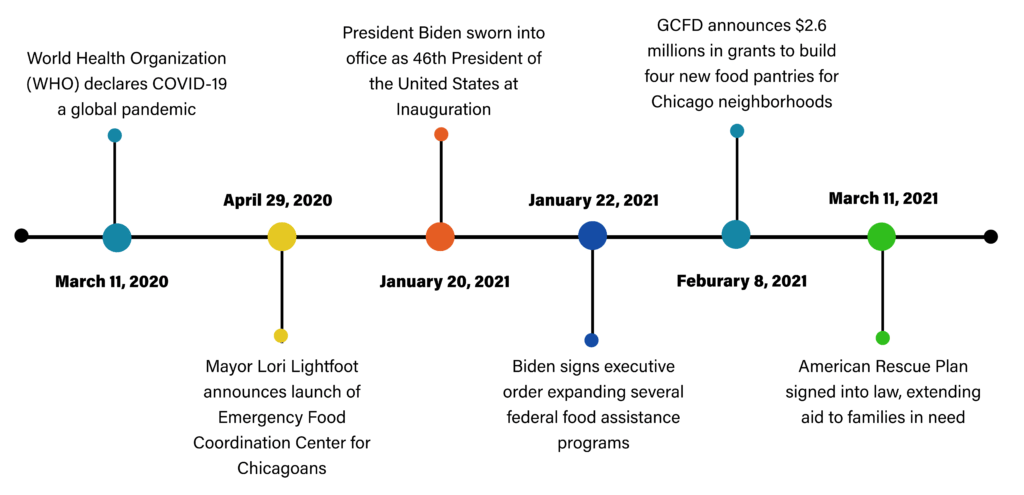BEYOND THE PANDEMIC: A CLOSER LOOK
Part 3 of a 4-Part Series
With the onset of COVID-19, the likelihood of experiencing food insecurity skyrocketed in the past year after consistently trending downwards over the last 20 years.
With additional factors such as increased unemployment numbers, rising poverty rates, as well as systemic racial inequities, the impact the pandemic has dealt to South Side families and families across the country has been acute. To curb on-going devastation, both federal and local governments have passed legislation to provide relief to those impacted while weathering the pandemic.
“The COVID-19 pandemic and resulting economic crisis has left millions of Americans, including an estimated 12 million children, struggling to figure out where their next meal is coming from. In the richest country on earth, this is an abomination.
“The American Rescue Plan takes a number of critical steps to help Illinoisans put food on the table, including boosting SNAP and P-EBT benefits — it’s one of the many reasons I was proud to vote in favor of this lifesaving legislation last month,” Congressman Bobby Rush (1st District), told the Crusader.
Locally, the Chicago Emergency Food Coordination Center launched at Malcolm X College at the start of the pandemic by Mayor Lori Lightfoot, in partnership with the Salvation Army and Greater Chicago Food Depository, ensures the delivery of meals to vulnerable Chicagoans diagnosed with or under quarantine due to COVID-19.
By dialing 3-1-1 adults aged 19 to 59 can request a seven-day emergency food bundle, typically delivered within 48 hours.
“Due to the unprecedented impact of the COVID-19 crisis, we have a responsibility as a city to support our residents and families during their urgent time of need,” Lightfoot said at the time of the center’s launch.
“This coordination center represents a critical resource not only for our communities, but for our entire city as we navigate this evolving challenge and ensure every Chicagoan remains safe, healthy and secure.

In the case of the federal government, The Emergency Food Assistance Program (TEFAP) administered by the Food and Nutrition Service agency under the U.S. Department of Agriculture (USDA) has increased its efforts to provide aid across the country.
With the mission to “supplement the diets of low-income Americans, including seniors, by providing them with emergency assistance at no cost,” TEFAP purchases healthful USDA foods which are made available to State Distributing Agencies.
The state is then responsible for disseminating said foods to local agencies that directly provide food to low-income families. Administrative funding is also provided to states to assist local organizations in the storage and distribution of USDA foods.
In 2020, TEFAP allocated a total of $48,716,381 in food and administrative entitlements to the state of Illinois, the fifth largest amount following California, Texas, Florida, and New York. The amount of food each state receives is calculated based on the total number of unemployed individuals and the number of individuals that fall under the state’s poverty level.
The TEFAP program works in tandem with other pre-existing programs such as the Supplemental Nutrition Assistance Program (SNAP) and the Pandemic-EBT (P-EBT) program. President Biden amplified both programs’ impact via executive order by increasing benefits.
These expansions were extended under the American Rescue Plan Act of 2021, signed into law March 11, 2021, one year to the day of the World Health Organization (WHO) declaring COVID-19 a global pandemic.

“Even before the COVID-19 pandemic, one in nine Illinois residents struggled with consistent access to meals, including one in six children. COVID-19 has exacerbated these challenges, but President Biden’s Rescue Plan makes historic investments to support hunger programs,” said U.S. Senator Richard Durbin (D-IL).
Under Biden’s American Rescue Plan Act of 2021, several additional programs were strengthened, increasing their ability to assist in feeding American families, such as the Special Supplemental Nutrition Program for Women, Infants and Children (WIC). Under the American Rescue Plan Act, the WIC program, which provides nutritious foods and supplement diets to low-income women, infants, and children up to age 5, was awarded an entitlement of $3 billion.
“From increasing SNAP and WIC benefits to expanding the reach of food banks, the American Rescue Plan will go a long way toward supporting community partners and helping children, seniors, and families put food on the table in this time of need,” Durbin told the Crusader.
As the entire country continues to endure the impact of the COVID-19 pandemic, the burden of providing food to the families on the South Side has lightened through the efforts of the Biden administration and local elected officials.

Thanks to the generosity of funding provided by The Field Foundation of Illinois, Inc. in producing this article.
(This story was published in the Chicago Crusader Newspaper April 24, 2021.)






